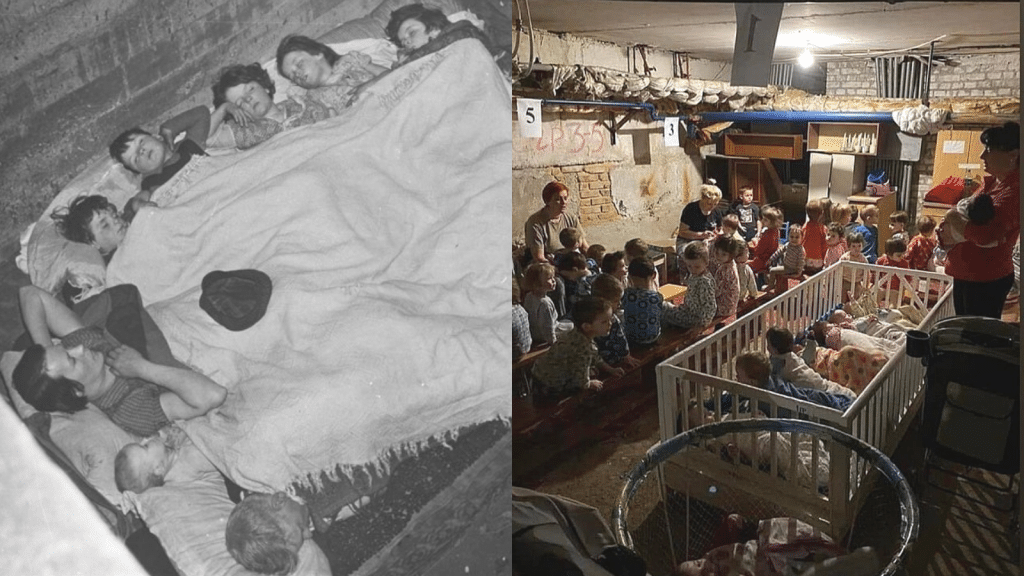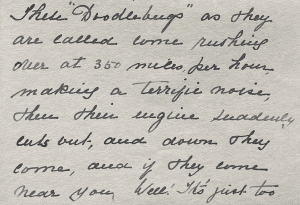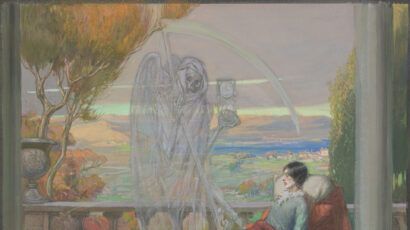WWII letter contains parallels with Russia’s attacks on Ukrainian civilians
By Robert K. Elder | April 5, 2022
 The photo on the left shows children sleeping in an air raid shelter during WWII in London, England. The photo on the right shows Ukrainian children and babies taking shelter in a basement in Kyiv during an air raid (Credit: Ministry of Internal Affairs of Ukraine, changes made, CC BY 4.0).
The photo on the left shows children sleeping in an air raid shelter during WWII in London, England. The photo on the right shows Ukrainian children and babies taking shelter in a basement in Kyiv during an air raid (Credit: Ministry of Internal Affairs of Ukraine, changes made, CC BY 4.0).
The voice is so immediate, so visceral, it sounds like accounts from Ukrainians being bombed by Russian forces today.
“[The bombs] come rushing over at 350 mph, making a terrific noise, their engines soundlessly cut out and down they come, and if they come near you, well, it’s just too bad.”
This unpublished letter, which I discovered last week in an Indianapolis antique store, was written by Maggie Payne, then living in the London borough of Bromley during World War II. The letter to her niece in Jacksonville, Florida, is dated July 2, 1944—almost 78 years ago.
Yet, the parallels to the current Russian invasion of Ukraine and reports of civilian deaths are shockingly modern. I thought of Yulia Zhdanova, a mother of two in Chernihiv, trying to find cover and protect her family as air raid sirens and explosions shattered her nerves.
“I cried, shouted to my family to go behind the walls in the corridor,” Zhdanova told NewsNation. “When we got into the corridor, we heard a very loud explosion. It was so noisy and so loud.”
In 1944, Payne wrote about what it was like to live as a civilian being targeted by German forces. Living under constant siege, Payne said that she and her family were “having a trying time, no rest, night, or day… and we have again taken to sleeping in our sheets, fully dressed…”
The bombs that Payne writes about were V-1 flying bombs or “Vengeance bombs”—also widely known as “Doodlebugs” or “buzz bombs” because they were powered by a jet engine, which made a recognizable sound much-feared by the residents of London.

“Their blast is very great and does much damage (but they make no crater),” wrote Payne. “…so it behooves one to take shelter double quick, and if you can, to live below ground level.”
These V-1 bombs were part of a terror campaign against non-combatants. According to the Imperial War Museums’ website, “Germany deployed its ‘revenge weapons’ (Vergeltungswaffen) in a bid to terrorize British civilians and undermine morale. Nazi propaganda hailed these weapons as ‘wonder weapons’ (Wunderwaffe) that might turn the tide of the war.”
It didn’t work.
And this week, news of increased civilian casualties in Ukraine has sparked US President Joseph Biden again to call Russian President Vladimir Putin a “war criminal.” Photos of executed civilians strewn across a street in Bucha were widely disseminated on social media and news outlets, adding to reports of illegal attacks that target civilians and state infrastructure.
News of a mass grave in Bucha feels both shocking and familiar to anyone versed in World War II history. The New York Post website even published a comparison to eerily similar photos of the conflicts.
More stories of civilian resilience in Ukraine have also surfaced, most recently with images of a column of Russian tanks stranded—and then destroyed—in narrow residential roads in Bucha.
“They thought they could just drive on the streets and go through. That they would be greeted as though it’s alright to come here,” Valery Spichek, a Ukrainian National Police officer, told CNN. “Maybe they think it is normal to drive around looting, to destroy buildings and to mock people…But our people didn’t allow it.”
Spichek sounds as defiant as Payne, writing in 1944: “If the Germans think they will break our morale, they are very much mistaken. Many homeless people take their trouble very philosophically and, with the help of our various organizations, look around and endeavor to start afresh.”
Together, we make the world safer.
The Bulletin elevates expert voices above the noise. But as an independent nonprofit organization, our operations depend on the support of readers like you. Help us continue to deliver quality journalism that holds leaders accountable. Your support of our work at any level is important. In return, we promise our coverage will be understandable, influential, vigilant, solution-oriented, and fair-minded. Together we can make a difference.
Keywords: Russia-Ukraine, Ukraine, Ukraine conflict, Ukraine crisis, World War II
Topics: Analysis















